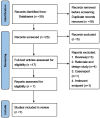Can proprotein convertase subtilisin/kexin type 9 (PCSK9) inhibitors regress coronary atherosclerotic plaque? A systematic review and meta-analysis
- PMID: 36777825
- PMCID: PMC9908469
Can proprotein convertase subtilisin/kexin type 9 (PCSK9) inhibitors regress coronary atherosclerotic plaque? A systematic review and meta-analysis
Abstract
Objective: Whether inhibition of proprotein convertase subtilisin/kexin type 9 (PCSK9) promotes the regression of coronary atherosclerotic plaque in statin-treated individuals remains unclear. This study examined whether PCSK9 inhibitors combined with statin therapy could increase atherosclerotic plaque regression compared with statin therapy alone.
Methods: PubMed, the Cochrane Central Register of Controlled Trials (CENTRAL), the database Clinical trials, and the Web of Science were searched to report the coronary atherosclerotic plaque of PCSK9 inhibitors using intravascular ultrasonography (IVUS) or optical coherence tomography (OCT) in statin patients. The weighted mean difference (WMD) of the random-effects/fixed-effects model was used to pool data that satisfied our inclusion criteria obtained from the included studies.
Results: When compared with statin therapy alone, pooled studies revealed that PCSK9 inhibitors combined with statin therapy significantly decreased percent atheroma volume (PAV) (WMD: -1.06%, 95% confidence interval [CI]: -1.39 to -0.73; P<0.001) and total atheroma volume (TAV) (WMD: -6.38 mm3, 95% CI: -10.12 to -2.64; P=0.001). Moreover, the fibrous cap thickness (FCT) of the coronary atherosclerotic plaque increases to 21.31 um (WMD: 21.31, 95% CI: 7.08 to 35.53, P<0.001), and the maximum lipid arc decreases 10.9° (WMD: -10.9, 95% CI: -15.24 to -5.34, P<0.001).
Conclusion: In our systematic review and meta-analysis, PCSK9 inhibitors combined with statin therapy were found to be more effective than statin therapy alone for slowing coronary plaque progression by decreasing PAV, TAV, and increasing FCT, maximum lipid arc.
Keywords: Coronary atherosclerotic plaque; IVUS; OCT; PCSK9 inhibitors.
AJTR Copyright © 2023.
Conflict of interest statement
None.
Figures



References
-
- Nicholls SJ, Ballantyne CM, Barter PJ, Chapman MJ, Erbel RM, Libby P, Raichlen JS, Uno K, Borgman M, Wolski K, Nissen SE. Effect of two intensive statin regimens on progression of coronary disease. N Engl J Med. 2011;365:2078–2087. - PubMed
-
- Nissen SE, Nicholls SJ, Sipahi I, Libby P, Raichlen JS, Ballantyne CM, Davignon J, Erbel R, Fruchart JC, Tardif JC, Schoenhagen P, Crowe T, Cain V, Wolski K, Goormastic M, Tuzcu EM ASTEROID Investigators. Effect of very high-intensity statin therapy on regression of coronary atherosclerosis: the ASTEROID trial. JAMA. 2006;295:1556–1565. - PubMed
-
- Takayama T, Hiro T, Yamagishi M, Daida H, Hirayama A, Saito S, Yamaguchi T, Matsuzaki M COSMOS Investigators. Effect of rosuvastatin on coronary atheroma in stable coronary artery disease: multicenter coronary atherosclerosis study measuring effects of rosuvastatin using intravascular ultrasound in Japanese subjects (COSMOS) Circ J. 2009;73:2110–2117. - PubMed
-
- Hiro T, Kimura T, Morimoto T, Miyauchi K, Nakagawa Y, Yamagishi M, Ozaki Y, Kimura K, Saito S, Yamaguchi T, Daida H, Matsuzaki M JAPAN-ACS Investigators. Effect of intensive statin therapy on regression of coronary atherosclerosis in patients with acute coronary syndrome: a multicenter randomized trial evaluated by volumetric intravascular ultrasound using pitavastatin versus atorvastatin (JAPAN-ACS [Japan assessment of pitavastatin and atorvastatin in acute coronary syndrome] study) J Am Coll Cardiol. 2009;54:293–302. - PubMed
Publication types
LinkOut - more resources
Full Text Sources
Miscellaneous
